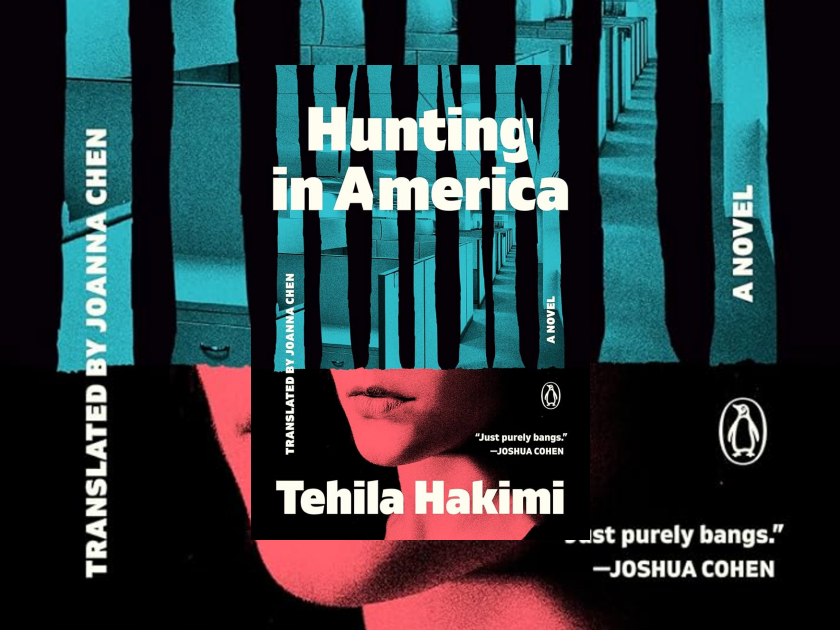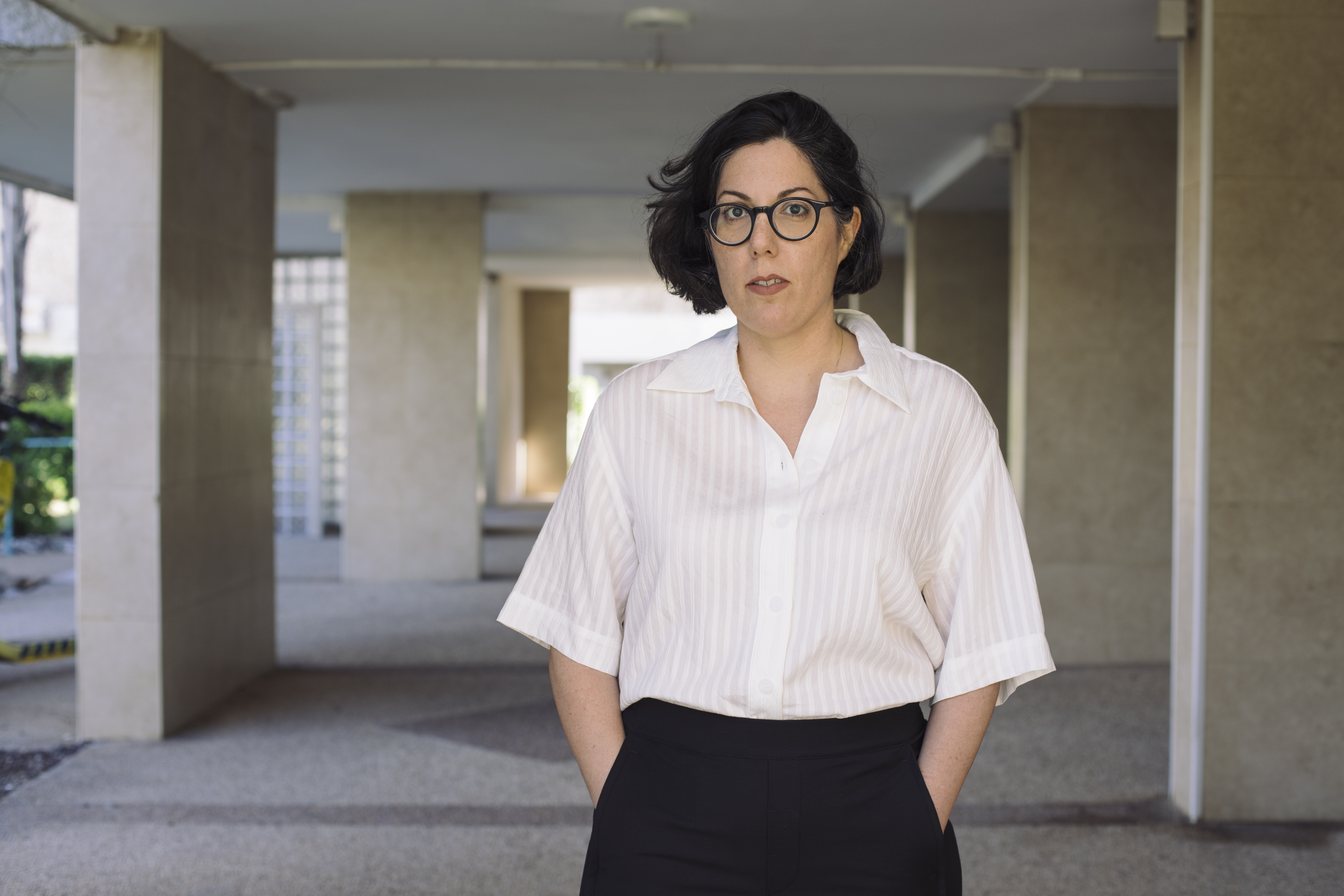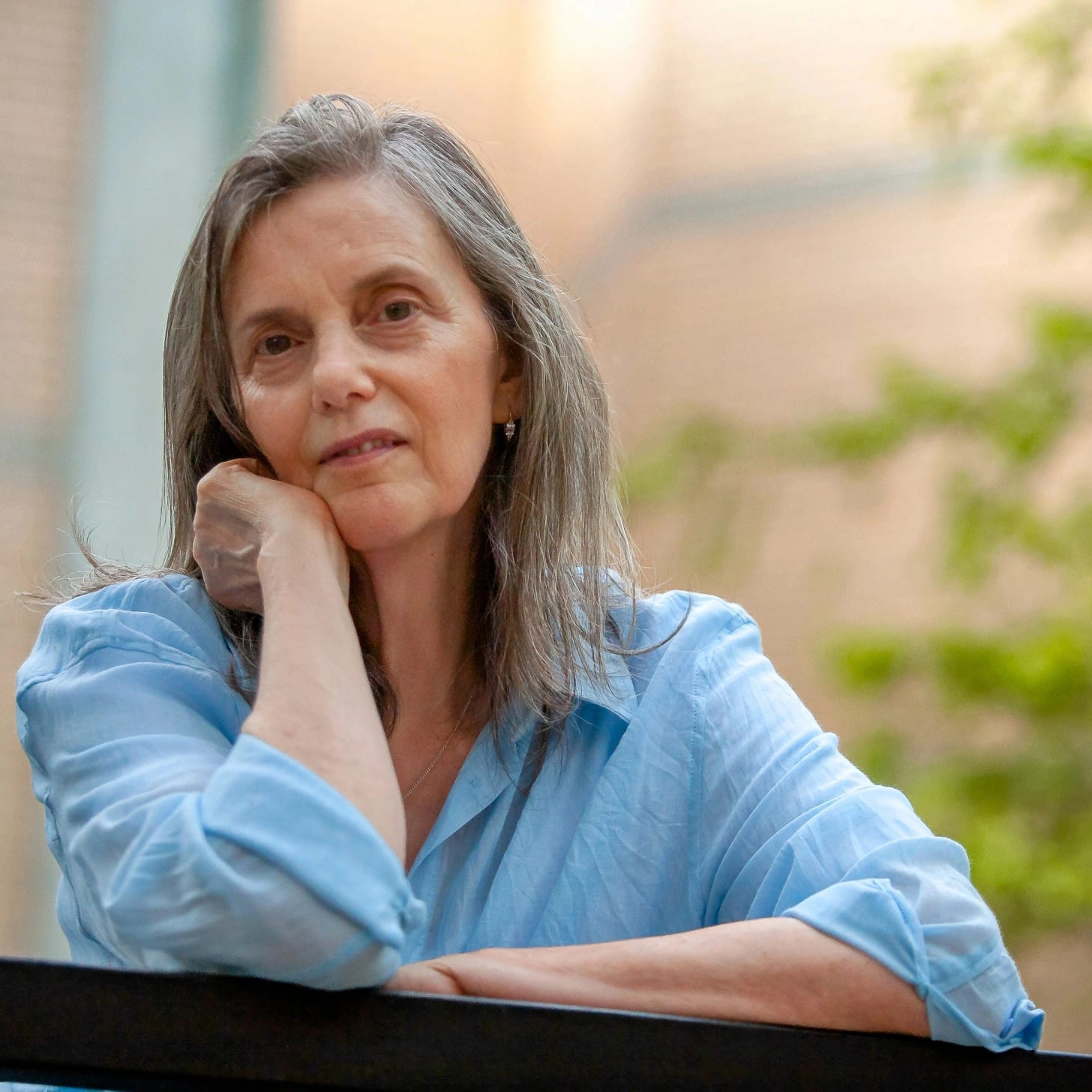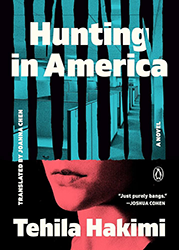Join a community of readers who are committed to Jewish stories
Sign up for JBC’s Nu Reads, a curated selection of Jewish books delivered straight to your door!

Tehila Hakimi’s Hunting in America is a dark tale about a woman who moves from Israel to America to leave her past behind. In this new country she becomes increasingly obsessed with hunting. Originally published in Hebrew, Hunting in America won the Jewish Book Council’s 2023 Paper Brigade Award for New Israeli Fiction. In addition to being a novelist, Hakimi is an accomplished poet. The novel has been translated into English by Joanna Chen.
Anna Stolley Persky: First off, I’d like to say how much I was influenced by your novel, particularly your ability to weave a complex story through a series of deer hunting trips that grow increasingly disturbing. When you began writing this book, what did you set out to accomplish? Did you start with the idea of hunting trips or something else?
Tehila Hakimi: This book started from my extensive exploration of the idea and concept of work in our time, and in particular women at work. I was thinking about our culture and how the nature of work has shaped our lives, emotionally and intellectually, when we all spend most of our waking hours at work. So, I had in mind this female protagonist, who is very much invested in her career, and I wanted her to get a promotion. Then I thought about the idea of “relocation,” which, for the Israeli middle class, is the holy grail of promotions. It became clear to me that she would be moving to America and holding a gun; she would go hunting. At that point, I had in mind both Israeli and American gun cultures, and, of course, the ties between the two countries. There’s a web of links between the two when it comes to weapons and the use of weapons, culturally, politically, and financially. In Israel, children grow up hearing the phrase: “Eat well, and you will grow up to be a soldier.” In the US, the right to bear arms is constitutional. In these devastating times, and as Gaza is being bombed and destroyed by the acts of Netanyahu’s government, and now the frightful war with Iran, the connections and dependencies between the US and Israel are obvious. This brotherhood of arms fascinated me. I also knew that the fact that she is Israeli and holds a gun in America would unfold layers I wished to explore. And still, this instrument, a gun, holds different references and meanings in Israel and in the US. Of course, a weapon is a weapon, but when you change something in the equation, like the circumstance or the culture, the context changes. People use guns, rifles, or weapons for all sorts of reasons. What intrigued me was how those reasons — and what a gun represents — transform across borders.
AP: Your novel details a woman who loses her sense of boundaries and perhaps her connection to reality. Interestingly, you never name the protagonist. What went into your decision to leave your protagonist nameless? Was there a particular effect you were going for?
TH: That’s a good point, and thank you for asking this question. My leading thought or instinct about this female protagonist was that she was very much invested in her career, to the point that she became some sort of instrumental part of the system. So this thought affected the way I wrote her voice, which is cold, distant, and non-reflective. Material-wise, I was often thinking of metal, and more specifically of steel. Even though I thought of her as sort of an instrument, she was still human; she is definitely not a robot, she is a human being, but the choices she made influenced her life and her soul. In regard to the name and the choice of point of view, because I do think these two aspects are tied to each other, I can say that at some point, after I already had the first draft of the novel, I was asking myself if this story should be told from a different perspective, from someone else’s, not hers, an omniscient narrator of some sort. But then I knew that if I made this change, it would not have the same effect, as this is a bodily experience: the handling of guns, the hunting, the memories the body holds, and of course being a woman at this particular age, almost forty. Is it crucial for me that she remains nameless? For me, this protagonist is every woman, or any woman; she could be me, and she could be someone else. I wanted all these options to stay open.
AP: Your protagonist appears to be trying to escape her past and build a new identity, but she’s struggling to assimilate into her new life and country. Her corporate position in the US doesn’t go smoothly at all, and I was curious about your experience in the corporate world and how it relates to the protagonist’s painful efforts. How did your background and interests play into the world you created for the protagonist? In addition, there are all kinds of tensions for a woman trying to succeed in a male-dominated structure.
TH: Work is a major topic in my literary work. My poetry, earlier hybrid prose, and also the graphic novel I co-published with the artist Liron Cohen, all revolve around the issue of work in our time. I can add that Hunting in America was also influenced by the fundamental works of David Graeber, and in particular Bullshit Jobs: A Theory and this idea of people spending years, even a lifetime, at a desk doing work that feels meaningless. I wanted to explore what happens to someone when the very center of their life — work — is hollowed out or taken from them. At the same time, I couldn’t ignore the ongoing reality that, in most countries today, women are still paid less, promoted less, and expected to carry more — at home, at work, and in life. That tension was crucial to bring into the story. The way employment works worldwide today, there is no such thing as work/life balance — and that dissonance is reflected in the novel. Specifically, my ten years in engineering also influenced aspects of the novel, such as the characters and the pace of things, as I was part of this machine, and I still am; like everyone, we are all part of this system. I also had some experience with working very hard, taking your job really seriously, putting it at the center of your life, and then the company I worked for went bankrupt. This experience made me much more suspicious about the place work should take in one’s life and also about the risk of merging ambition and passion, which usually comes with a serious career path.

Author photo of Tehila Hakimi by Silan Dallal
AP: Your worldbuilding here is incredible. I think what I found most interesting is how you engulfed your reader in the protagonist’s new life in America with such crisp, concise descriptions. How does your background as a poet contribute to your writing style? What were your goals when choosing what to include and what to leave out of the narrative?
TH: My poetry and prose are connected. The form is different, the way words lie on the page, but poetically I think they are tied, mixed in some way. While my poetry is sometimes prosaic, and my poetry books have a narrative arc, my prose tends to have rhythm and an inner pulse. While working with Joanna Chen on the final drafts of the translation, the places where I found something that went wrong were where I had a weird gap in rhythm and pace. That also says a lot about Joanna’s brilliant translation work, and how she managed to capture the voice and translate it to English so beautifully. Aside from that, I think what I took most from poetry writing into this book is the choice to say more while being less descriptive, less elaborate.
AP: I noticed how you included careful and specific details about each hunting trip the protagonist takes so that it made me feel like I was next to the protagonist every time. It all made me wonder how experienced you are in hunting. Are you a hunter yourself or did you have to read up on the topic? How did you do your research?
TH: I am not a hunter, and I have never gone hunting. In the beginning, in terms of guns, I relied on my memories from my army training. I went back to the physical and emotional discomfort, stress, anxiety, and excitement I remembered I used to feel when using a firearm, and its weight on the body — the way it becomes part of you.
After writing the first two chapters, I knew I had to write this novel while I was in the US, on the same land and speaking the same language as my characters, and immersed in the culture, even for a short while. I was so grateful to participate in the International Writing Program at the University of Iowa, where I wrote the first draft of this novel; it allowed me to be in the same place as my protagonist.
I never actually went hunting, I did plan to go and join local hunters, but I came to the conclusion that it might be too much for me to witness the act in person. I was afraid that I would then find it hard to write about this character, to be on her side, to like her. Instead, I did lots of research online. I watched lots of hunters and hunting vloggers, I read about various restrictions, hunting laws in different states, and various types of rifles. I went shopping in search of the perfect hunting rifle. My reading materials also included texts about the politics of gun control and about women with firearms.
I wanted to explore what happens to someone when the very center of their life — work — is hollowed out or taken from them.
AP: Joanna, the prose in Hunting in America is sparse, yet hauntingly beautiful. What were the challenges in translating the novel into English? Were there particular portions that took more time than others, and if so, why?
JC: In all good prose there is poetry, and Hunting in America is no exception. I needed to hear the music and initially asked Tehila to read to me from the book. I listened carefully. The protagonist’s voice is disembodied – she has no name, her emotions are muted, she is unattached to either person or place. It took time and several revisions before I began to hear her voice.
The sections on the actual act of hunting were particularly challenging. Tehila goes into precise detail about buying a gun, and there are several sections in which the protagonist goes out hunting. I read a lot about how to hunt deer, I watched tutorials explaining how to shoot deer, how to skin them. Tehila patiently explained to me how to hold a gun, how to clean it. I needed to understand the literal nuts and bolts before I could translate these sections.
AP: This question is for both of you. This is a particularly challenging time for Israeli writers. Joanna, I know that you had a piece in Guernica that set off a whole debate about whether literary magazines should publish Israeli authors. We know that there have been calls to boycott Israeli and “Zionist” writers and silence their voices. What is your experience with this?
TH: This is indeed a very challenging, devastating time. As we speak, the Israeli government just opened another front with Iran, and the US joined in bombing sites around the country. Tel Aviv, where I live, is being bombed every night and day by Iran, and people are being killed; families and homes are destroyed, in Israel, Iran, and Gaza, which is completely destroyed. I truly understand any organization, person, or public figure who resents and protests against the Israeli government’s actions at this moment.
Hunting in America is my first book to be published in a different language, so I have no comparison of how the process might have worked before. I will have to wait and see what kind of responses it will receive. I do think this novel is very relevant to some of the pressing issues of this time, and I hope it will be read by a wide audience. I know from my Israeli publishers and also from my agent that it’s a hard time to sell books by Israeli authors, and also a hard time to publish foreign books in Hebrew in Israel, as many authors refuse to be translated to Hebrew. I can’t imagine myself without reading Mahmud Darwish’s poetry, and Forugh Farrokhzad’s poetry, nor listening to Fairuz’s songs, and I can go on with examples. For me, it’s crucial to continue the dialogue in times of peace and in times of war. To have this conversation is crucial, to know what’s behind that curtain of political intentions and actions of leaders and government; if not in person, then to get to know the people through literature, to get a glimpse into their lives. And of course, I think culture should not be silenced nor boycotted.
JC: Censoring writers is the last thing we need to be doing right now in the literary world. I want to hear other voices and opinions, particularly during these difficult times. If I were only to read Jewish authors, for example, my world would be a lot narrower and a lot less nuanced. Literary translation is a crucial bridge to other worlds and we must not shy away from crossing it.

Author photo of Joanna Chen
AP: Casual acceptance of violence is a big theme in this novel, and it becomes increasingly horrifying as the story progresses. What are your concerns about violence in our times, both in Israel and in the US? What is your personal experience with violence and did that influence your writing?
TH: It’s true that violence is a big theme in the novel but so is love. In particular, I was intrigued by the intersection between violence and love, or the option of love, and the question of whether it is possible in our current world where larger forces of capitalism, patriarchy, and war come into play. I think these two forces contradict and also feed each other. Being a woman today is to double everything, as women are more likely to be attacked by a partner, a friend, or a colleague. Living today is to experience violence on so many levels, and in Israel specifically. First — war, an actual one that is going on in this moment — but also in language, where for decades the word peace was completely deleted from the conversation. The horizon is war, the present is war — I wonder, is peace on anyone’s agenda? And then the neoliberal system, where people are a profit line in someone’s spreadsheet. It is a devastating fact that while there is more wealth in the world there are more people living in poverty than ever. I am deeply concerned, first about language, because that is where everything starts, and then about all the rest.
AP: Your protagonist falls for her colleague and hunting guide, David. But he has his own complicated and disturbing past. How did you go about crafting this character?
TH: I felt David was the male lead character for this story. Both the protagonist and David are broken for different reasons, but in a way that allows them to fit together. David wasn’t modeled on anyone in particular. As their relationship grew, I felt she needed to know more about him, but at the same time, the reader knows only what the protagonist does, or what she wants to know about him, and what he can or will share. This also relates to questions of love and intimacy, and how these are navigated in the face of power, violence, and different cultures.
AP: Religion does not appear to be a theme in your novel, and I’m wondering if that was deliberate or not, or if it’s there, but under the surface. Where does religion fit into the world that you create in Hunting in America?
TH: It’s a very interesting angle. I think that religion is part of this story in terms of the culture this woman comes from. Israeli culture is very religious, even around its secular ends, and also very conservative. All these aspects contribute to the protagonist’s need to leave her life behind — the conservative expectations for women her age and in her situation, single and childless.
AP: After reading your novel, I started thinking even more about loneliness and identity. The protagonist seems determined to leave her past behind, but then her life seems so devoid of meaning. We all certainly try to shape our identity and go through phases when we want to shake off our former selves. Could you speak on this?
TH: I think we all carry our identity with us, everywhere we go; whatever that is — gender, religion, or perhaps country of origin. Only for a few are these aspects transparent; the privileged ones. I think that in this novel, the very first image that came to my mind was: “Okay, this woman lands her dream job, and then she is there, in America, and then, immediately, I knew she was holding a gun.” I was not sure yet what she was going to do with that, but I knew she was trained. I knew she was familiar with it, like an old friend you hadn’t seen for ages, and suddenly he is back, and he just fits right in. That’s the heart of what you wish to forget, what you can’t, and also what ties you to your homeland, to your language.
AP: What authors influence you both? I am particularly curious about writers who are Jewish, Israeli, or both. Are there any authors whose books compelled you to keep writing and if so, why?
TH: Natalia Ginzburg, Primo Levi, Kafka, Georges Perec, Philip Roth, and J.M. Coetzee. And from Israel: Orly Castel-Bloom, Shimon Adaf, Sami Berdugo, Yudit Shahar, Dror Mishani, and Dorit Rabinyan. In American literature, I admire Joshua Cohen’s work, and I am a big fan of Miranda July and Ottessa Moshfegh. I can’t imagine myself writing anything without reading, and with Hunting in America I was influenced by Disgrace by J.M. Coetzee, Life: A User’s Manual by Georges Perec, The Dry Heart by Natalia Ginzburg, Dolly City by Orly Castel-Bloom, Amerika by Franz Kafka, and The Plot Against America by Philip Roth.
JC: I love the poetry and prose of Eaven Boland, Eula Biss, Jane Hirshfield, and Doireann Ní Ghríofa. I deeply appreciate Mahmoud Darwish, Muriel Rukeyser, and Adrienne Rich. I often turn to Gregory Orr’s book of essays, Poetry as Survival when words evade me. Kazuo Ishiguro’s Klara and the Sun is a book I reread while translating Hunting in America. Among the Israeli fiction writers I appreciate are Zeruya Shalev, David Grossman, and Etgar Keret. Some of my favorite Israeli poets are Agi Mishol, Yonatan Berg, and Diti Ronen, all of whom I’ve been lucky enough to translate. Right now I’m reading Eran Tzelgov, an amazing poet and translator.
AP: This novel has been called subversive, and when I read that, I wondered, What does that even mean? What does subversive mean to you, and do you think that is an apt description?
TH: When you ask about this word, or what it means to me, I go straight to Hebrew. As you might know, the Hebrew language is much more limited than the English language; in dictionaries, there are approximately 120,000 words in Hebrew, while there are 600,000 words in English. Although Hebrew is quite limited, it has this special quality — a single word can hold several meanings or reference many directions — words from different areas of thought or links to biblical stories. In Hebrew, the word “subversive” has the same root letters as the word “to row,” as in rowing a boat, and then you have this picture in your head of this person rowing against the current. I find it so beautiful to have this image in mind, with this word in particular, and in general. Back to your question, I hope my novel opens up questions, doubts, and thoughts about being a woman, capitalism, guns, and the current political situation. I think it can do that, and I hope it will.

Hunting in America by Tehila Hakimi, translated by Joanna Chen
Anna Stolley Persky, a journalist and lawyer by background, writes fiction and creative nonfiction. She’s been published in The Washington Post, Mystery Tribune, Ellery Queen, and Pithead Chapel.